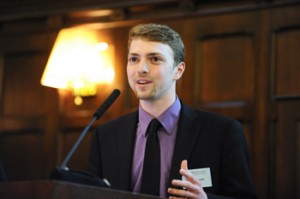
FCRH sophomore Tim Luecke presents a drawing that explores the iPad’s potential for creating fine art compositions. Photo by Chris Taggart
Outstanding students are not made; they are cultivated. On April 14, the University’s Office of Development and University Relations brought together students and their alumni mentors in an evening event that recognized the work of Fordham’s Prestigious Fellowship Advisory Board.
The board enlists some of the University’s most distinguished alumni—former scholarship recipients themselves—to mentor individual students on projects that can serve as the foundation for prestigious scholarship applications. The goal, said Fordham College at Rose Hill (FCRH) Dean Michael Latham, Ph.D., is to help polish skills that help attract fellowships.
“Students are very good at navigating academic life, but to really succeed at the top level they have to be able to interact with people from many different walks of life,” Latham said. “Through your mentoring, they learn to express themselves to people in government, in finance . . . often those persons who serve on scholarship committees.
“You help them reach their highest level of compatibility,” he said.
Four students presented their mentored projects, which were all supported by Fordham’s St. Edmund Campion Institute.
• Tim Luecke, a FCRH sophomore, presented a drawing that explores the iPad’s potential for creating fine art compositions;
• Megan Harries, a Fordham College at Lincoln Center (FCLC) junior, outlined her interest in combining chemistry with environmental science;
• Anna Maria Shaker, an FCRH sophomore, said that as an Egyptian American, she had incentive to study causes and solutions to Middle Eastern unrest; and
• Evangelos Razis, an FCLC sophomore, said his dream is to become a member of the Council on Foreign Relations.
Mentor Winston J. Churchill, FCRH ’62, a former Rhodes Scholar and member of Fordham’s Board of Trustees, said that his own journey from physics undergraduate to Yale-educated lawyer to educational philanthropist had taught him the value of mentoring new generations.
“You are all lucky to be here, but the issue is what you are going to do with it,” said Churchill, the managing general partner of SCP Partners and chairman of the Churchill Foundation. “In my family, they say the more you give away, the more you have left.”
The advisory board works throughout the academic year with faculty members to offer seminars at which students can practice the art of discussion and debate and then apply what they have learned. During the fall term, students focus on theoretical discussion of contemporary issues; in the spring, students practice writing and mock interviews on topics they have studied.
In addition to one-on-one mentors, students are assisted by faculty advisers Patrick Hornbeck, Ph.D., assistant professor of theology; Mary Beth Combs, Ph.D., assistant professor of economics; and Anne Hoffman, Ph.D., professor of English.
